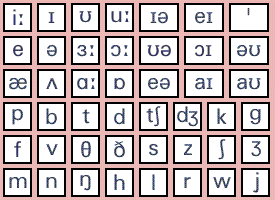

|
|
Study, work or travel in the UK. British
culture and life.
|
|
||
|
|
|
|
||
 |
||||
|
|
|
|
||
|
|
||||
 |
||||
|
Study British English pronunciation
|
||||
|
Sections:
|
Pronunciation |
 |
| Links | ||
|
Related pages:
|
Bookshops | |
| Dictionaries | ||
| Grammar | ||
| Spelling | ||
| Vocabulary | ||
| Mistakes |
(1) Elementary level
 |
Tree
or Three? |
New
Headway Elementary Pronunciation Book Author: John Soars, Liz Soars Publisher: Oxford University Press Date: February 2002 Cassette Tapes / CD |
 |
Ship
or Sheep? Author: Ann Baker Publisher: Cambridge University Press Date: July 1981 Cassette Tapes |
 |
New
Headway Intermediate Pronunciation Book Author: John Soars, Liz Soars Publisher: Oxford University Press Date: February 2002 |
 |
English
Pronunciation Illustrated Author: John Trim, Peter Kneebone Publisher: Cambridge University Press Date: September 1975 Cassette Tapes |
 |
Pronunciation
for Advanced Learners of English Author: David Brazil Publisher: Cambridge University Press Date: October 1994 Cassette Tapes |
New
Headway Upper Intermediate Pronunciation Book Author: John Soars, Liz Soars Publisher: Oxford University Press Date: February 2002 |
 Phonemic symbols for British English |
Ballet: ball-ay (ba-llay): stress is on the first part in Britain, but
on the second part in America
Clerk: clark (clurk): rhymes with 'park' in Britain, but rhymes with
'work' in America
Lever: leever (levver): rhymes with 'fever' in Britain, but it is often
pronounced to rhyme with 'never' in America
Privacy: pri-va-see (pry-va-see): the 'i' is short in Britain (like the
'i' of 'image'), but long in America (like the 'i' of 'idea')
Schedule: shed-yool (sked-yool): 'sch' is pronounced like 'sh' in 'ship'
in Britain, but like 'sk' in 'skip' in America
Tomato: to-maa-tow (to-may-tow): 'ma' is like the 'ma' of 'mark' in Britain,
but like the 'ma' of 'make' in America; rhymes with potato in America, but not
in Britain
Vase: vaaz (vayz): rhymes with Mars in Britain, but with maze in America
The vowel sounds in American English are often quite different from those in
British English, especially the "o" and "a" sounds, and
the "r" at the end of a word. There are of course many regional variations.
When compared with the sounds of Oxford English, the most obvious pronunciation
differences are with people who come from the west and south of the US (for
example: California or Texas), and are less obvious for people from the east
or north (for example: New York or Washington). Ask a British and American person
to say "bottle of water", and compare the "o" sound of "bottle"
and the "a" and "r" sounds of "water".
To hear different ways of pronouncing English within different regions of the
UK and across different countries in the world, listen to the sound files on
these sites:
International Dialects of English Archive: http://web.ku.edu/idea
alt-usage-english.org Audio Archive: http://alt-usage-english.org/audio_archive.shtml
The speech accent archive (George Mason University): http://accent.gmu.edu
 |
English
Pronouncing Dictionary with CD-ROM Publisher: Cambridge University Press Date: July 2003 |
 |
Oxford
Dictionary of Pronunciation for Current English (guide to British and American English, using IPA) Publisher: Oxford University Press Date: September 2003 |
 |
Gimson's
Pronunciation of English Authors: A.C. Gimson, Alan Cruttenden (Editor) Publisher: Hodder Arnold Date: March 2001 |
 |
Longman
Pronunciation Dictionary Author: J.C. Wells Publisher: Longman Date: March 2000 |
English/English dictionary: Dictionary
Automatic (machine) translations: Translate
Tests of English: English/Exams
Wordplay: Ideas/Fun
Home page: Home
Back to top
© UK Student Life 2002-2009
|
|
|